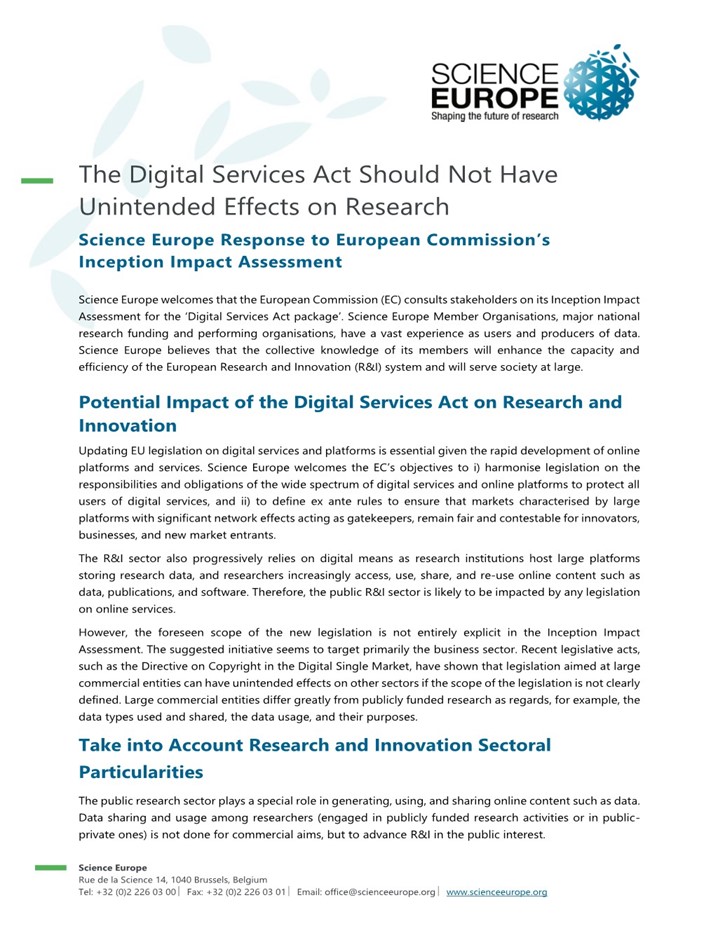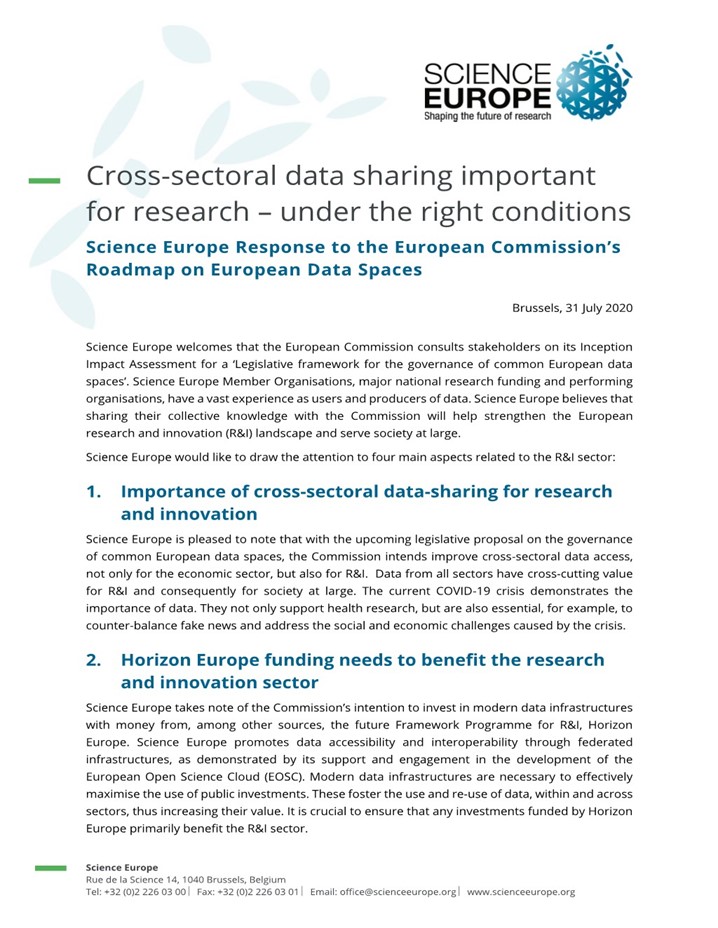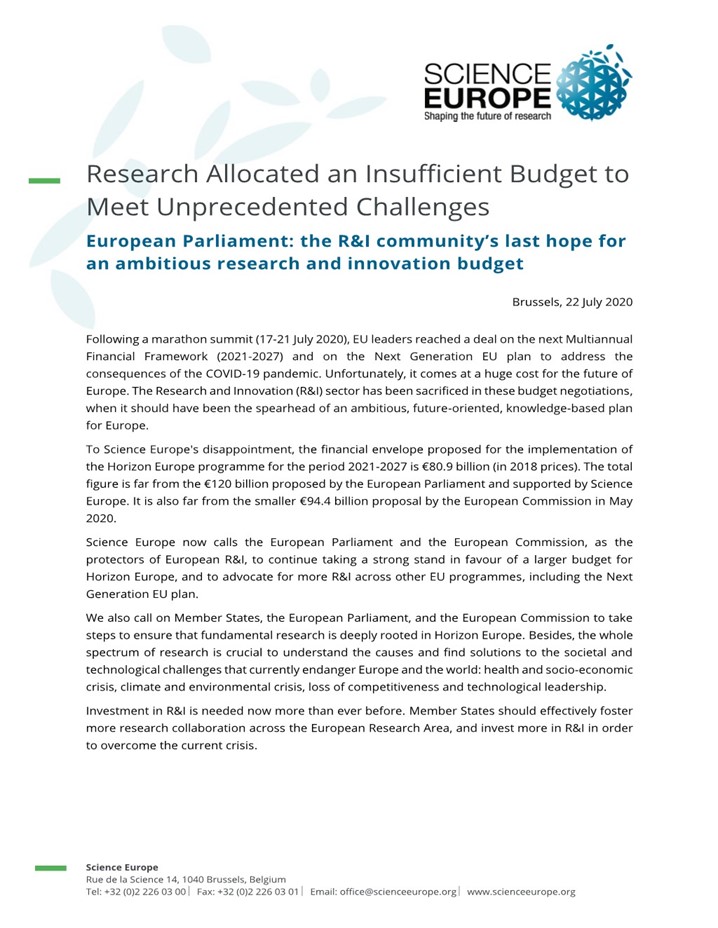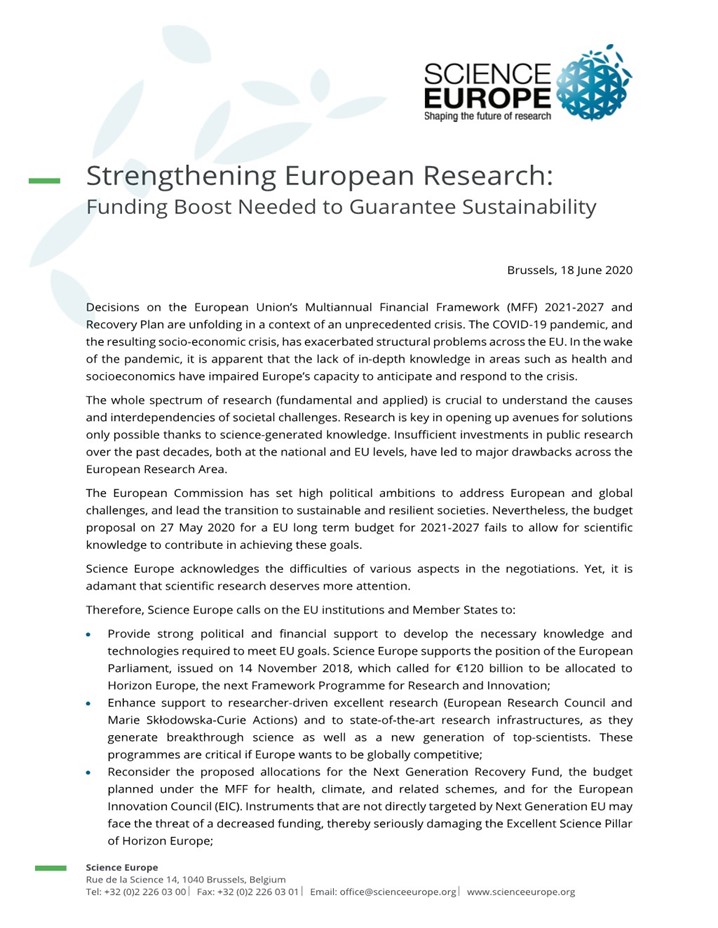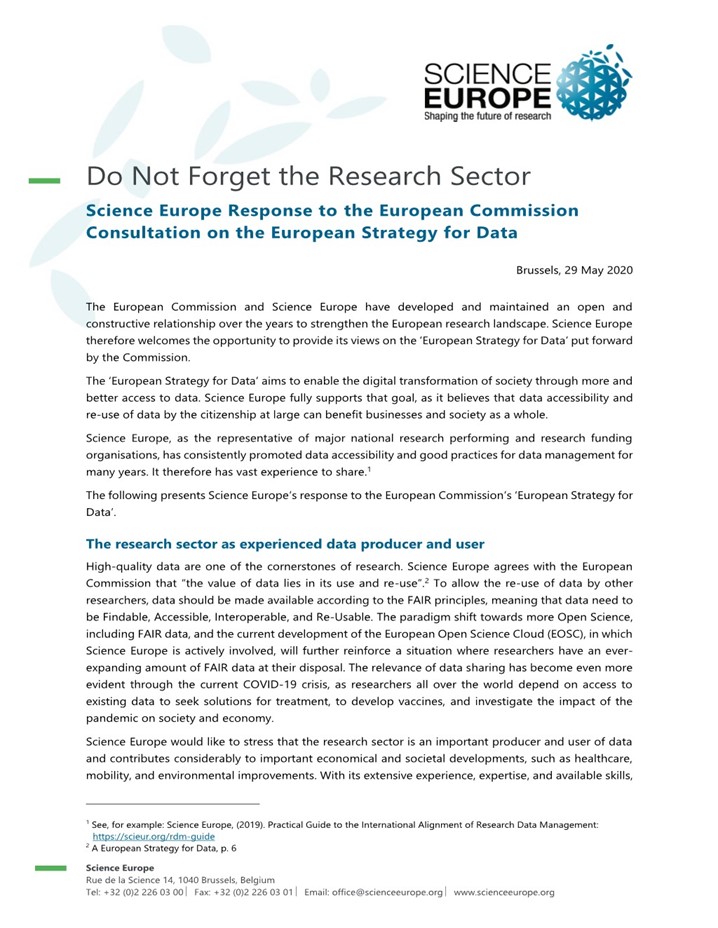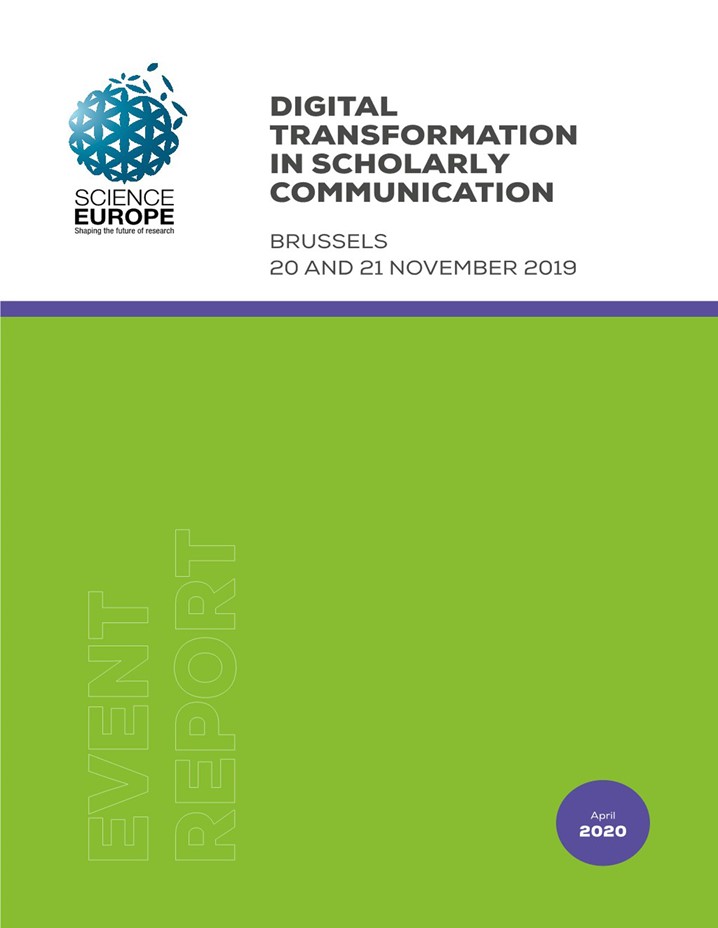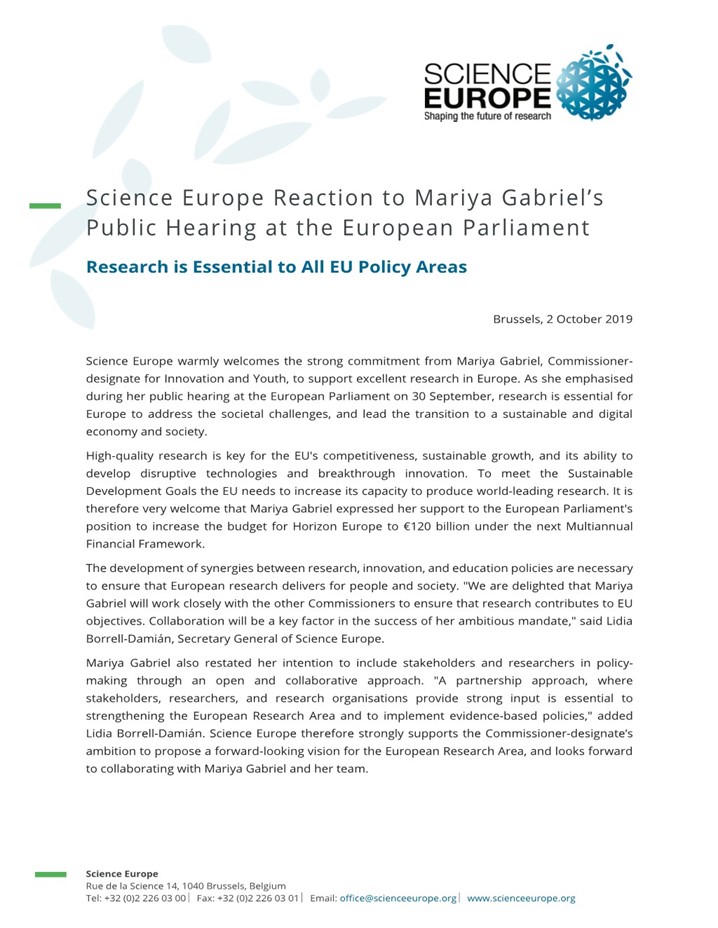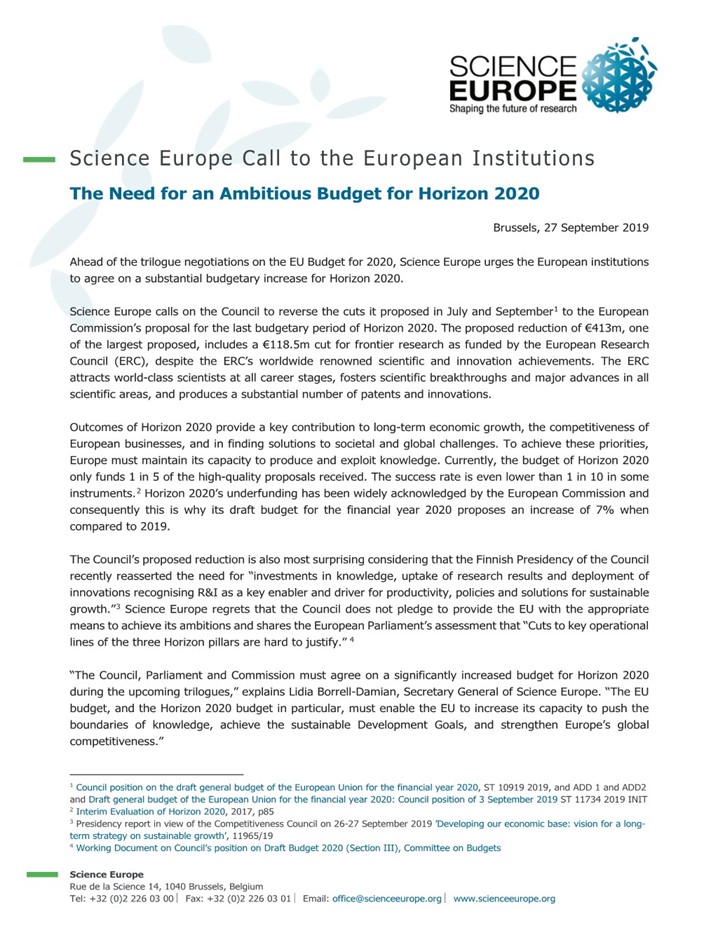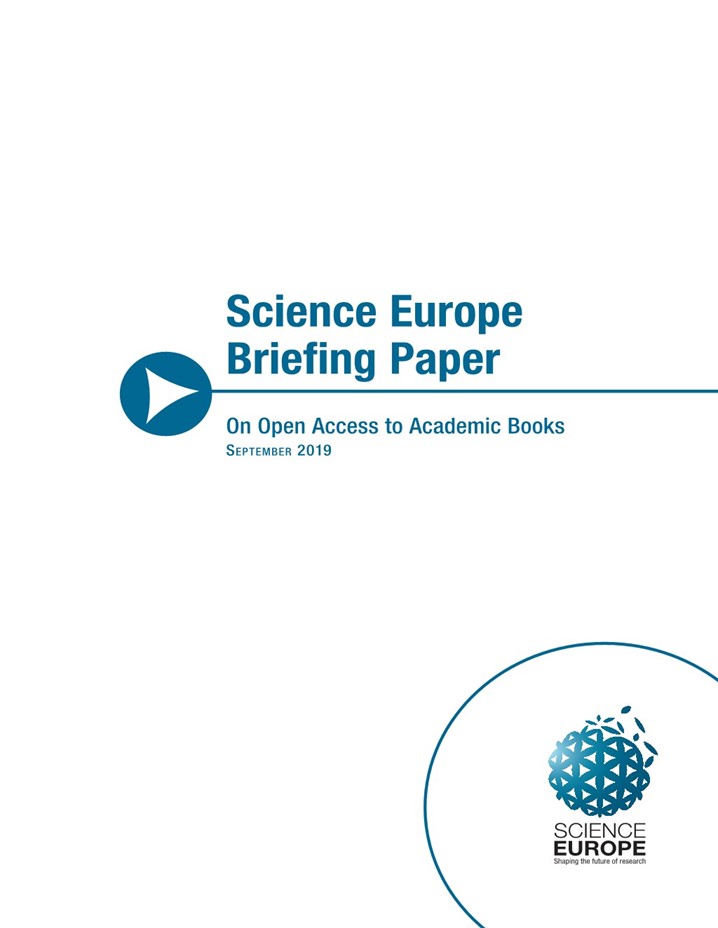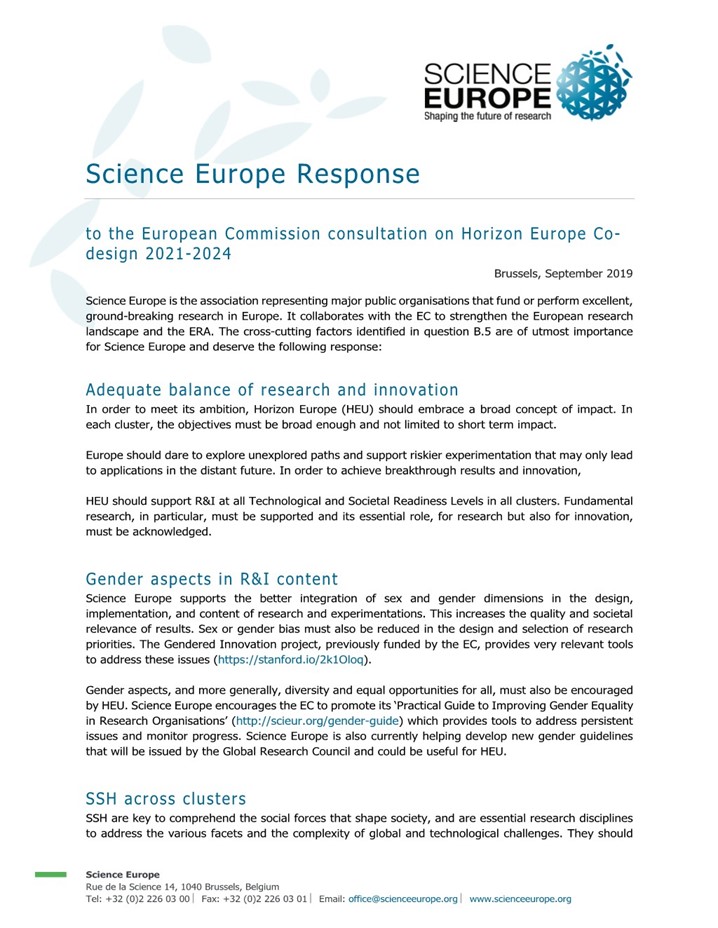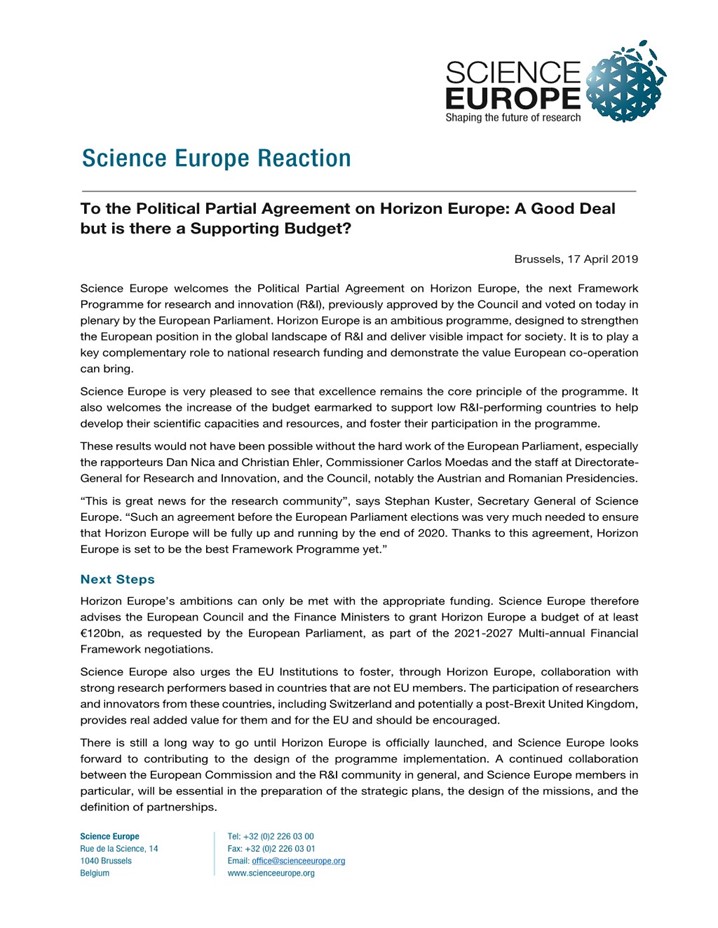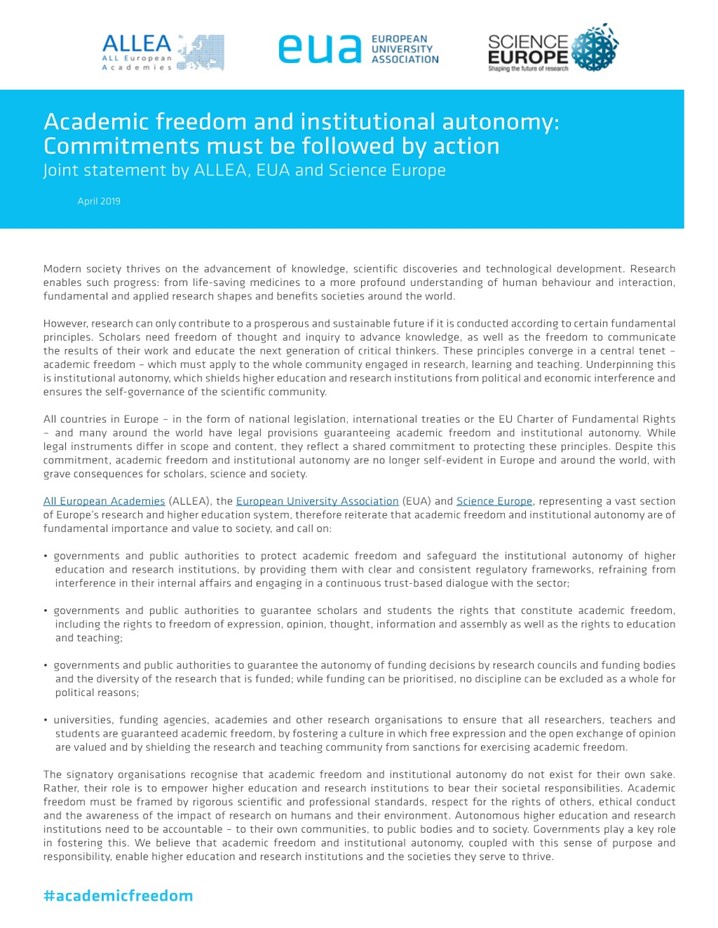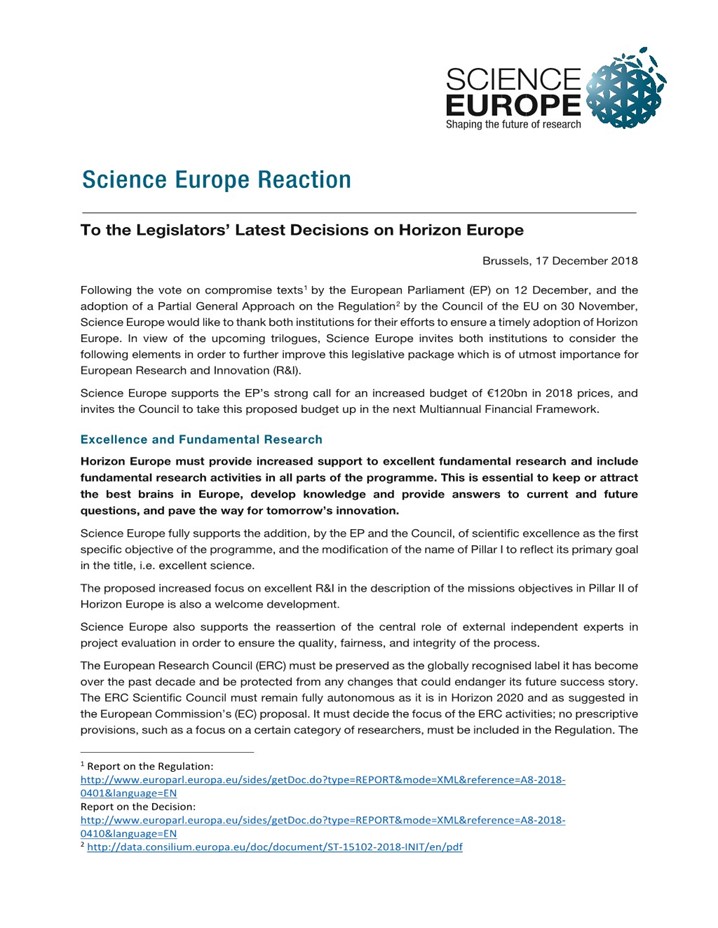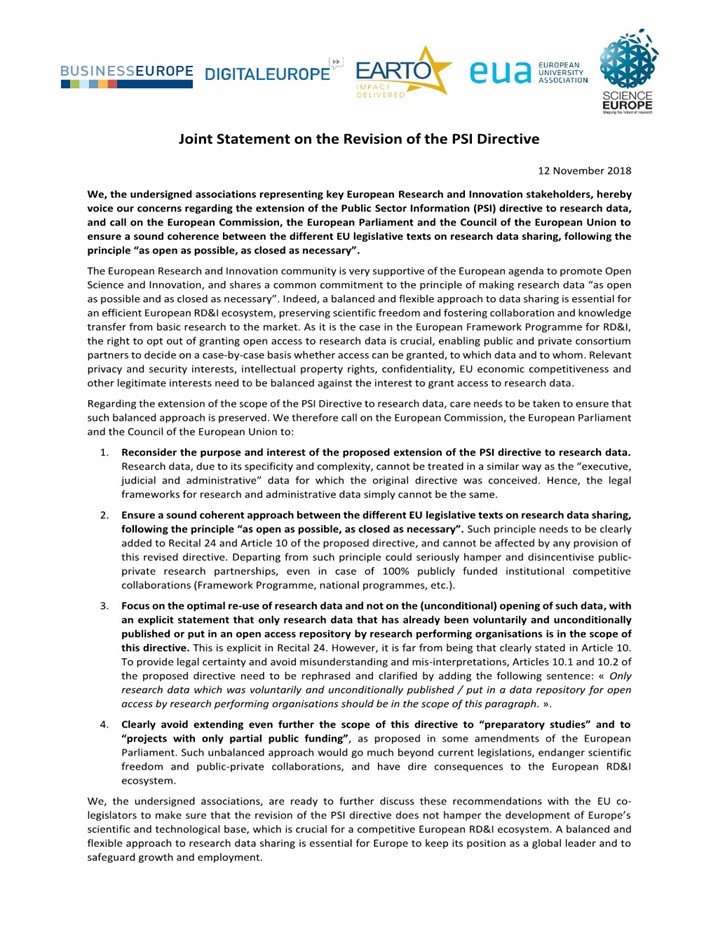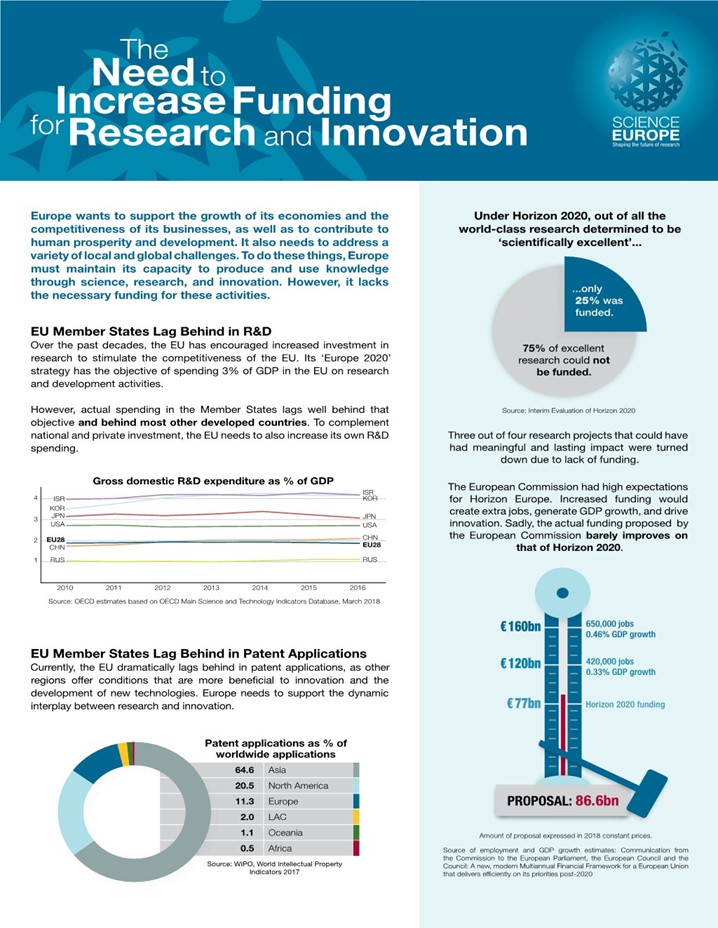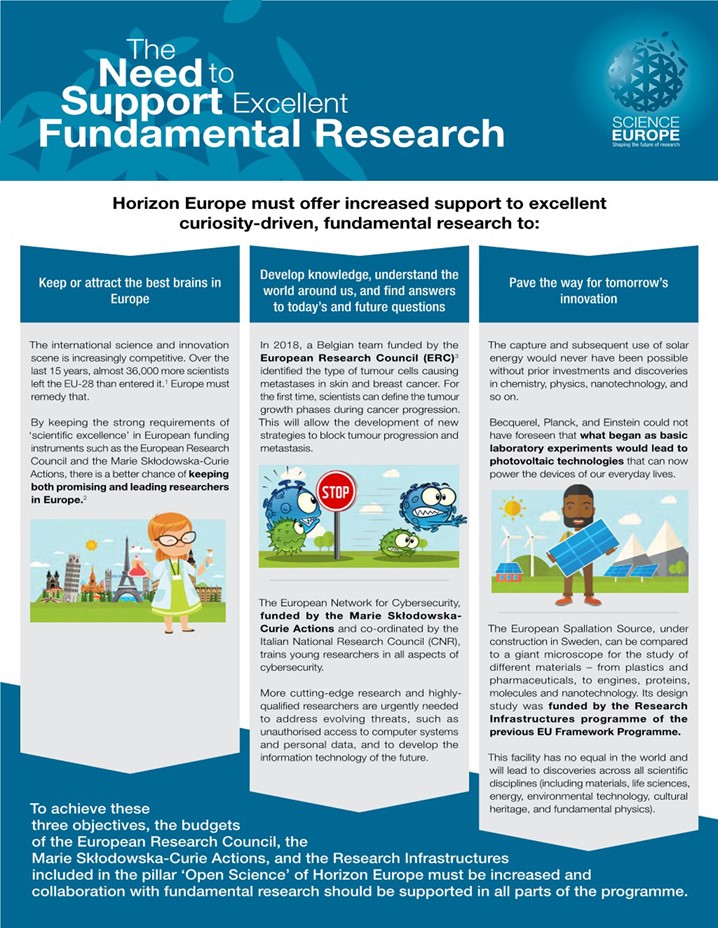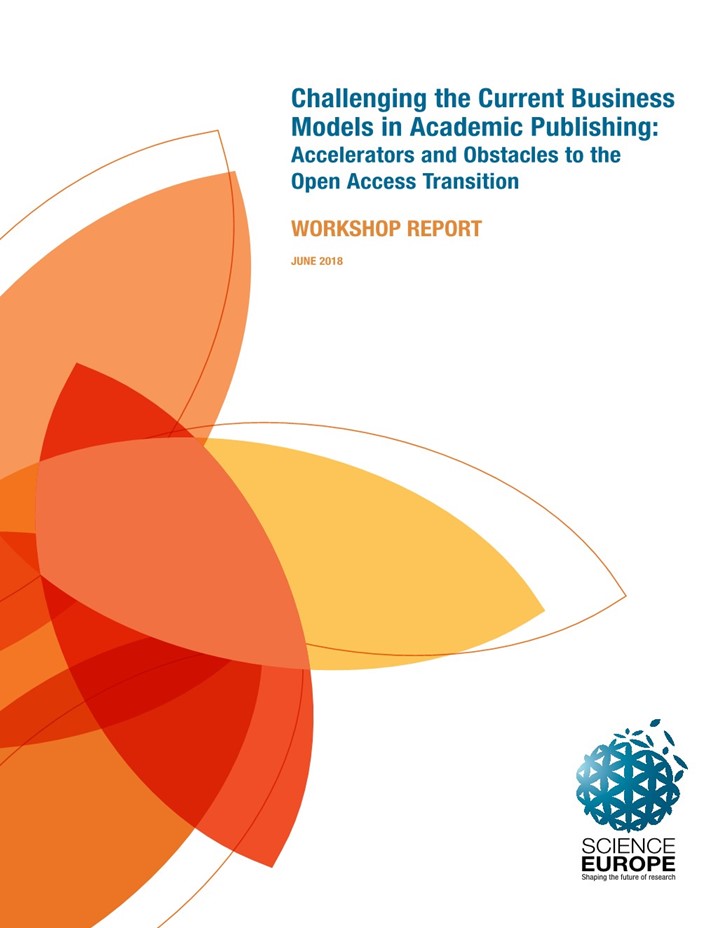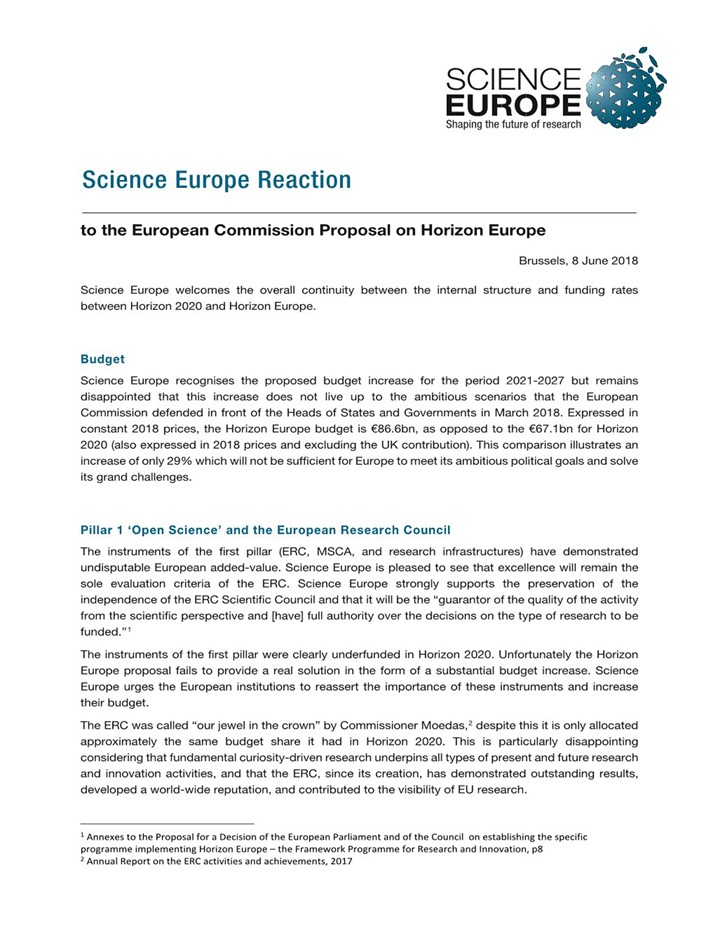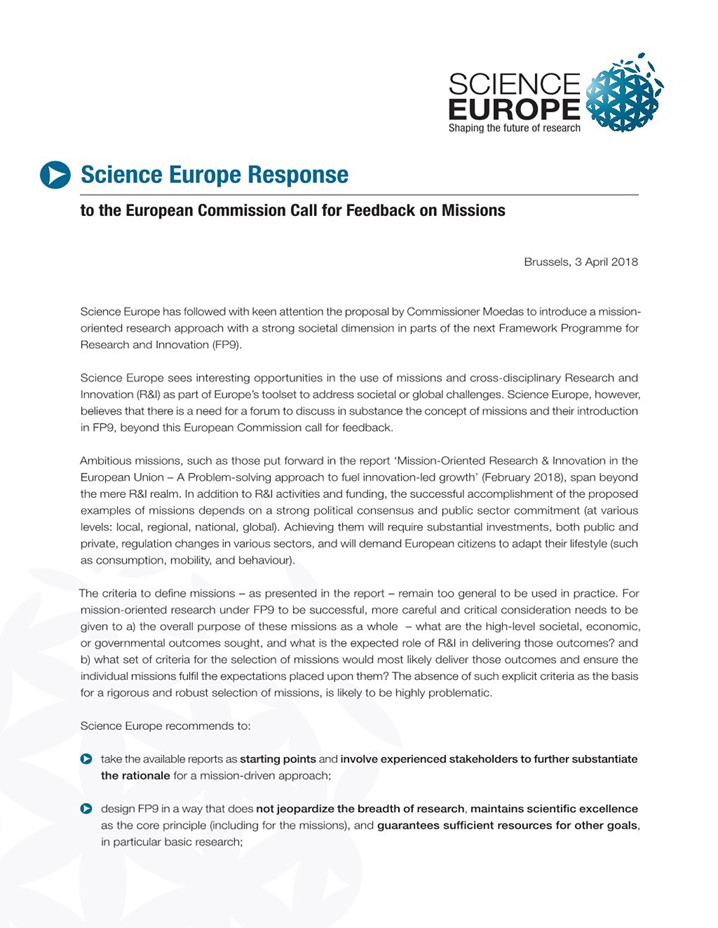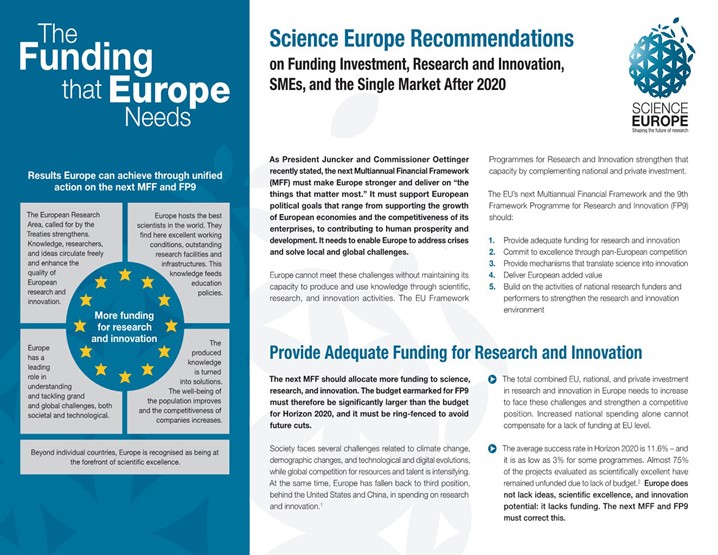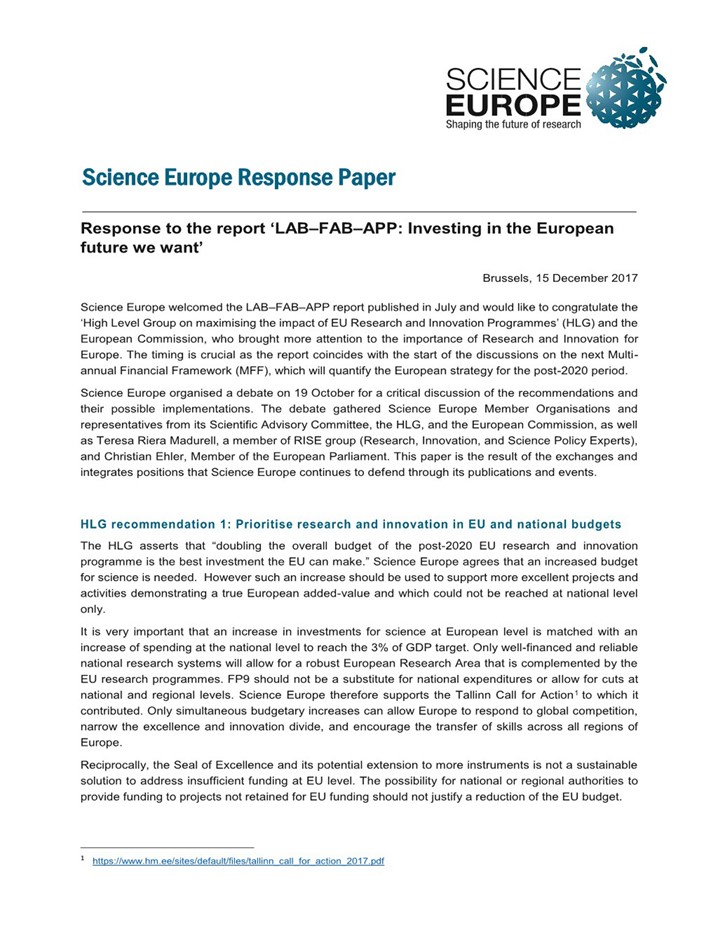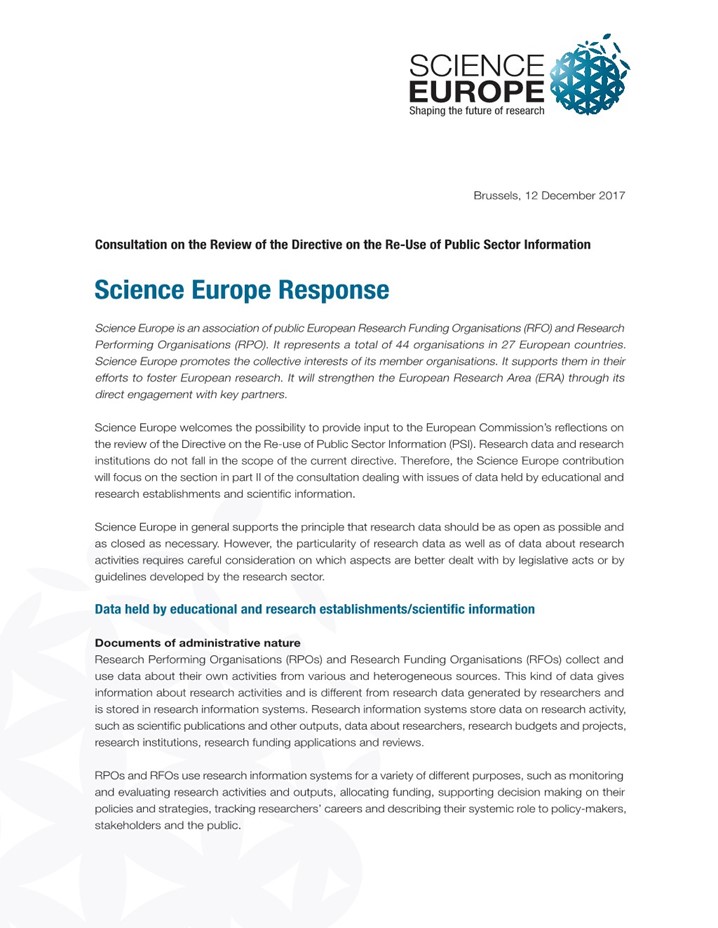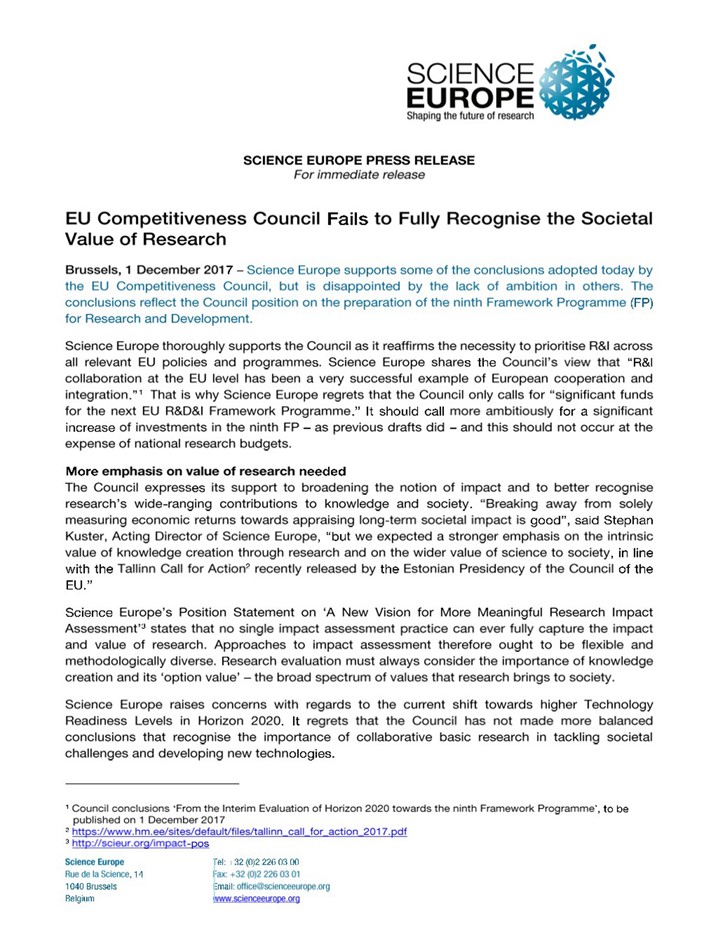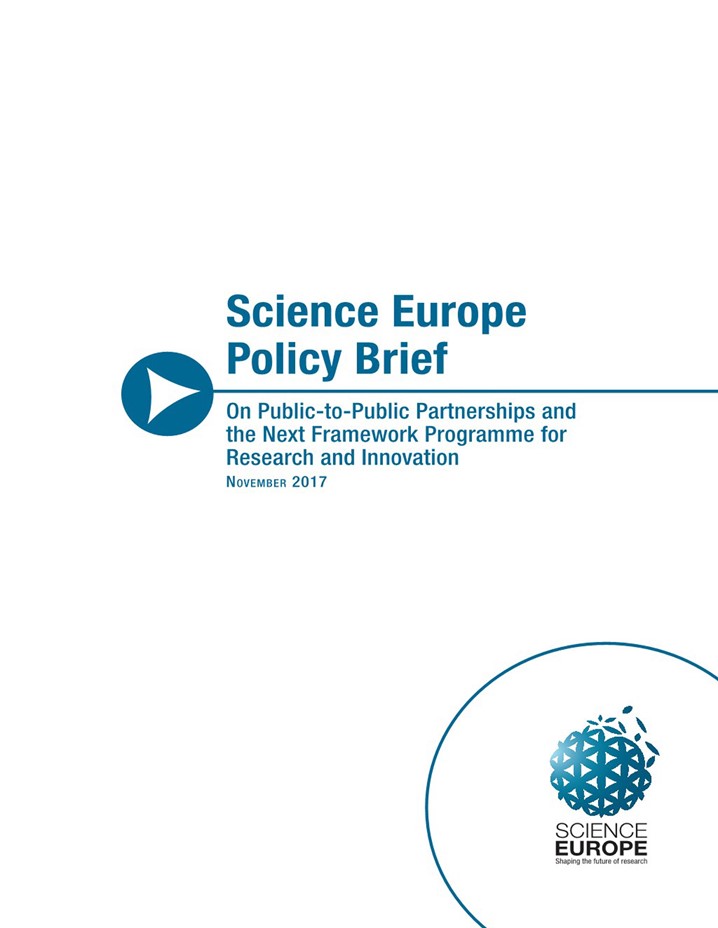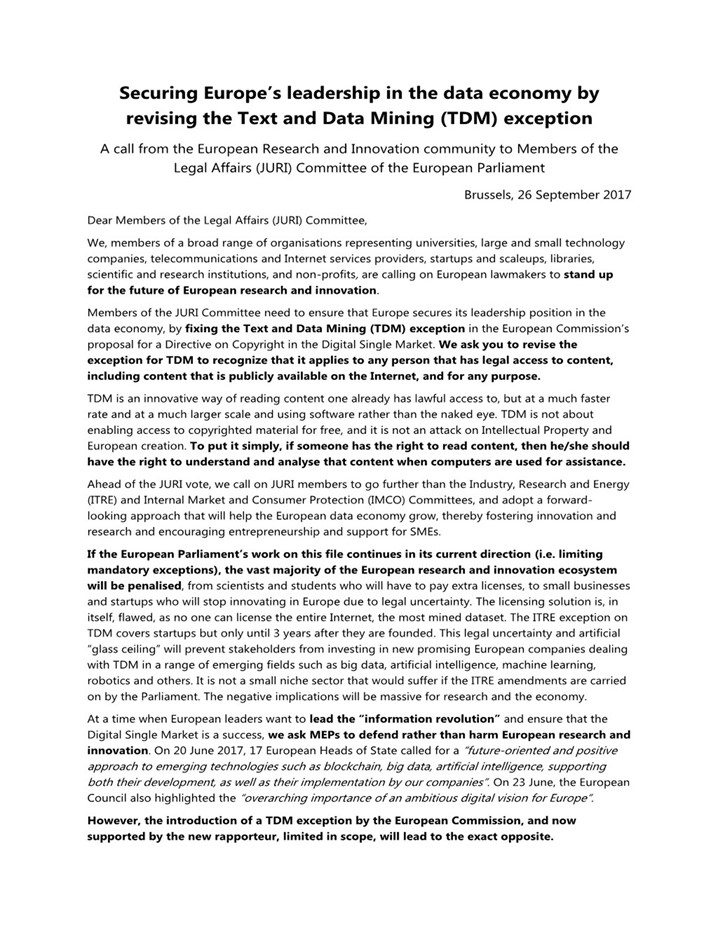Member-only content is available on this page. Please log in to view this content.

Our resources
Discover Science Europe’s comprehensive library of resources, including the most recent publications, briefings, and position statements.
101 resource(s) found
Response to the European Commission's Inception Impact Assessment on the Digital Services Act
In its response to the European Commission, Science Europe highlights that the foreseen scope of the new legislation is not clearly defined and greater clarification should be introduced to ensure that the Digital Services Act does not have unintended effects on research.
Response to the European Commission Roadmap on European Data Spaces
In its response to the European Commission Roadmap for an upcoming legislative proposal on the governance of common European data spaces, Science Europe reinforces the need to consider sectoral policies to ensure coherence.
Reaction to the European Council's Proposal for the European Budget
The Research and Innovation (R&I) sector has been sacrificed in these budget negotiations, when it should have been the spearhead of an ambitious, future-oriented, knowledge-based plan for Europe. Science Europe now calls the European Parliament and the European Commission, as the protectors of European R&I, to continue taking a strong stand in favour of a larger budget for Horizon Europe
Strengthening European Research: Funding Boost Needed to Guarantee Sustainability
Science Europe calls on the leaders of the EU to dedicate increased funding to research and innovation at the 19 June European Council meeting on the EU long-term budget and COVID-19 recovery fund.
An increased budget is necessary to meet the ambitious objectives of the European Union for a sustainable, healthy planet, and to ensure the global competitiveness of its research sector.
Science Europe also emphasises the need for sustained European leadership in tackling all COVID-19-incurred challenges.
Response to the European Commission Consultation on the European Strategy for Data
Science Europe calls on the European Commission to take into account the important role of the research sector as producer and user of data. The longstanding experience of the research sector should feed into the development of an overarching EU data strategy that promotes data access across sectors.
In its response to the EC consultation on the European Strategy for Data, Science Europe also underlines the need to consider sectoral policies to ensure coherence between overarching and sectoral policies.
Workshop Report on Digital Transformation in Scholarly Communication
The 20 and 21 November 2019 Science Europe Workshop on Digital Transformation in Scholarly Communication explored how new possibilities and technologies provided by the digital transformation can impact the future of the scholarly publication process.
Reaction to Mariya Gabriel’s Public Hearing at the European Parliament: Research is Essential to All EU Policy Areas
Science Europe warmly welcomes the strong commitment from Mariya Gabriel, Commissioner-designate for Innovation and Youth, to support excellent research in Europe. Research is essential for Europe to address the societal challenges, and lead the transition to a sustainable and digital economy and society.
Science Europe Call to the European Institutions: The Need for an Ambitious Budget for Horizon 2020
Ahead of the trilogue negotiations on the EU Budget for 2020, Science Europe calls on the Council to agree to a substantial budgetary increase for Horizon 2020. Outcomes of Horizon 2020 provide a key contribution to long-term economic growth, European competitiveness, and in finding solutions to societal and global challenges.
Briefing Paper on Open Access to Academic Books
So far, much of the focus of the transition towards Open Access has been on scholarly and scientific articles. However, a significant number of disciplines, notably – but not only – within the Social Sciences, the Arts, and the Humanities produce and heavily use books. This briefing paper identifies the key issues at stake in implementing a policy of Open Access to academic books, and outlines recommendations for different stakeholder groups to facilitate and accelerate such a policy.
Response to the European Commission Consultation on Horizon Europe Co-design 2021-2024
For Horizon Europe’s ‘Strategic Plan’ 2021-2024, Science Europe urges the European Commission to support cutting-edge research and innovation at all Technological and Societal Readiness Levels, and to adopt objectives that are not limited to short term impact. Europe should dare to explore unexplored paths and support riskier experimentation. Moreover, Science Europe recommends to reinforce a series of cross-cutting factors to increase the scientific, economic, and societal impacts of Horizon Europe.
Reaction to the Political Partial Agreement on Horizon Europe: A Good Deal but is there a Supporting Budget?
Science Europe welcomes the Political Partial Agreement on Horizon Europe, voted on today in plenary by the European Parliament. Science Europe is very pleased to see that excellence remains the core principle of the programme. However Horizon Europe’s ambitions can only be met with the appropriate funding and we therefore advise that Horizon Europe is granted a budget of at least €120bn.
Joint Statement on Academic Freedom and Institutional Autonomy
Released in partnership with the All European Academies (ALLEA) and the European University Association (EUA), this joint statement reinforces Science Europe’s resolve to work together with its partners to uphold academic freedom and institutional autonomy, absolutely essential principles for the conducting of high-quality research in Europe.
Reaction to the Legislators’ Latest Decisions on Horizon Europe
In view of the upcoming trilogues between the three European institutions, Science Europe invites all parties to consider a series of elements to further improve the legislative package for Horizon Europe. The budget of €120bn proposed by the European Parliament is a very welcome proposal and should be taken up by the Council in the next Multiannual Financial Framework. Moreover, fundamental research must be included in all parts of the programme, including the European Innovation Council.
Joint Statement on the Revision of the PSI Directive
In this joint statement research and Innovation stakeholders call on the EU institutions to seek a balanced approach to data sharing in response to the European Commission’s proposal for a revision of the Directive on re-use of public sector information (PSI Directive). While the partners are supportive of the European agenda to promote Open Science and innovation, and share a common commitment to the principle of making research data ‘as open as possible and as closed as necessary’, there is a need to focus on the optimal re-use of research data and not on the (unconditional) opening of such data.
Factsheet on the Need to Increase Funding for Research and Innovation
The overall funding for research and innovation in Europe needs to be increased and an adequate ring-fenced budget should be provided for Horizon Europe. In this factsheet Science Europe illustrates some of the reasons why.
Factsheet on the Need to Support Fundamental Research
The European Commission proposal for Horizon Europe falls short of acknowledging the importance of fundamental research. This factsheet demonstrates the essential role fundamental research plays, not only for research, but also for innovation.
Challenging the Current Business Models in Academic Publishing: Accelerators and Obstacles to the Open Access Transition
‘Big Deals’ are one of the dominant but highly-disputed business models in academic publishing. The model needs to be further analysed before it can be used as an instrument to implement and increase Open Access. This workshop was as organised to trigger further expert discussions on the current business models and consider the available alternatives.
Reaction to the European Commission Proposal on Horizon Europe
Science Europe welcomes the overall continuity between the internal structure and funding rates between Horizon 2020 and Horizon Europe. However, the proposed budget increase for the period 2021-2027 does not live up to the ambitious scenarios defended by the European Commission in front of the Heads of States and Governments in March 2018 and will not be sufficient for Europe to meet its ambitious political goals.
Response to the European Commission Call for Feedback on Missions
Science Europe sees interesting opportunities in the use of missions and cross-disciplinary Research and Innovation as part of Europe’s toolset to address societal or global challenges. However, the criteria for selecting missions so far have been too broad and more discussion is needed on the concept of missions and their introduction in FP9.
The Funding that Europe Needs: Recommendations on the Multiannual Financial Framework
The Multiannual Financial Frameworks (MFF) determine the budget allocation of the EU over a period of seven years. Science Europe recommends strengthening science, research, and innovation by increasing their budget in the MFF for 2021–2027 and to take measures to ensure that the 9th Framework Programme for Research and Innovation will have the capacity to achieve its goals.
Response to the Report ‘LAB–FAB–APP: Investing in the European Future we want’
This is Science Europe’s response to the report ‘LAB–FAB–APP: Investing in the European Future we want’ by the High Level Group on maximising the impact of EU Research and Innovation Programmes. It outlines points of agreement, as well as additional or alternative recommendations, from Science Europe Member Organisations on how the future of European research should take shape.
Response to the Consultation on the Review of the Directive on the Re-Use of Public Sector Information
Science Europe supports the principle that research data should be “as open as possible and as closed as necessary.” However, the particularity of research data as well as of data about research activities requires careful consideration on which aspects are better dealt with by legislative acts or by guidelines developed by the research sector.
EU Competitiveness Council Fails to Fully Recognise the Societal Value of Research
Science Europe supports some of the conclusions adopted today by the EU Competitiveness Council, but is disappointed by the lack of ambition in others. The conclusions reflect the Council position on the preparation of the ninth Framework Programme (FP) for Research and Development.
Policy Brief on Public-to-Public Partnerships and the Next Framework Programme for Research and Innovation
A more strategic approach is needed to the co-ordination between regional, national, and European research activities and to the initiatives supporting them. This briefing presents policy makers with the Science Europe view on how to better organise regional, national, and European research efforts.
Securing Europe’s Leadership in the Data Economy by Revising the TDM Exception
This open letter, signed by the European Research and Innovation community, calls on Members of the European Parliament and the Council to secure Europe’s leadership in the data economy by revising the Text and Data Mining (TDM) exception in the draft of the Directive on Copyright in the Digital Single Market. It calls for the TDM exception to apply to any person that has legal access to the content to help the European data economy grow, foster innovation, and encourage entrepreneurship.

